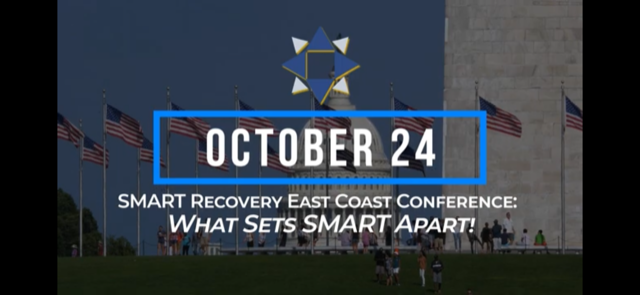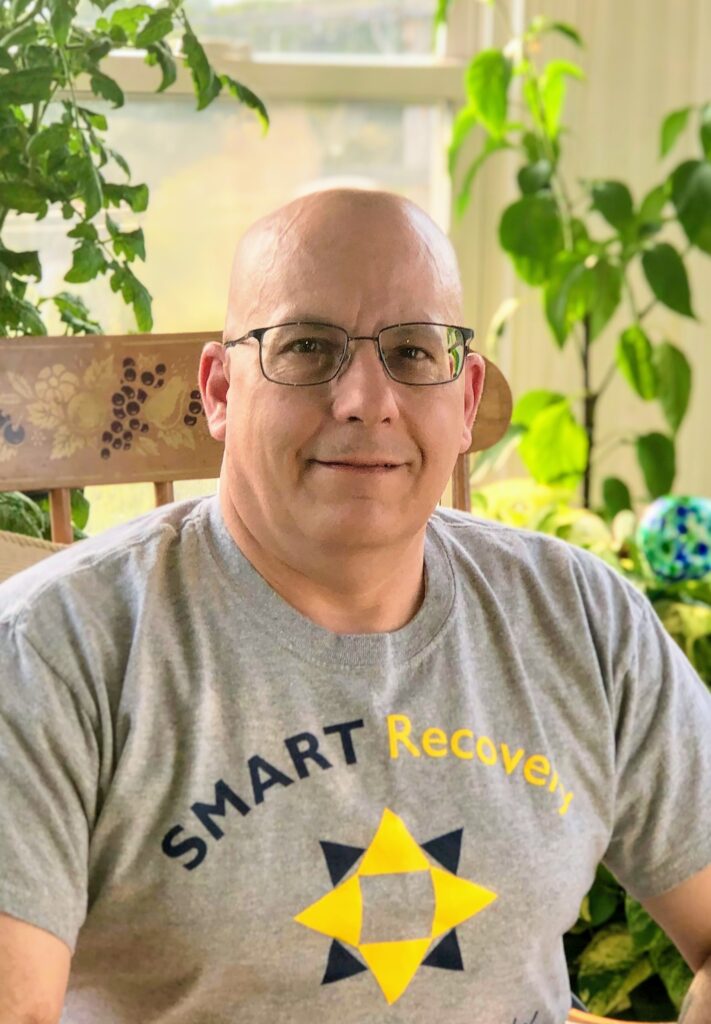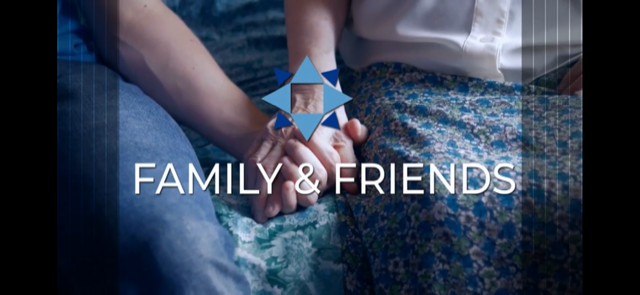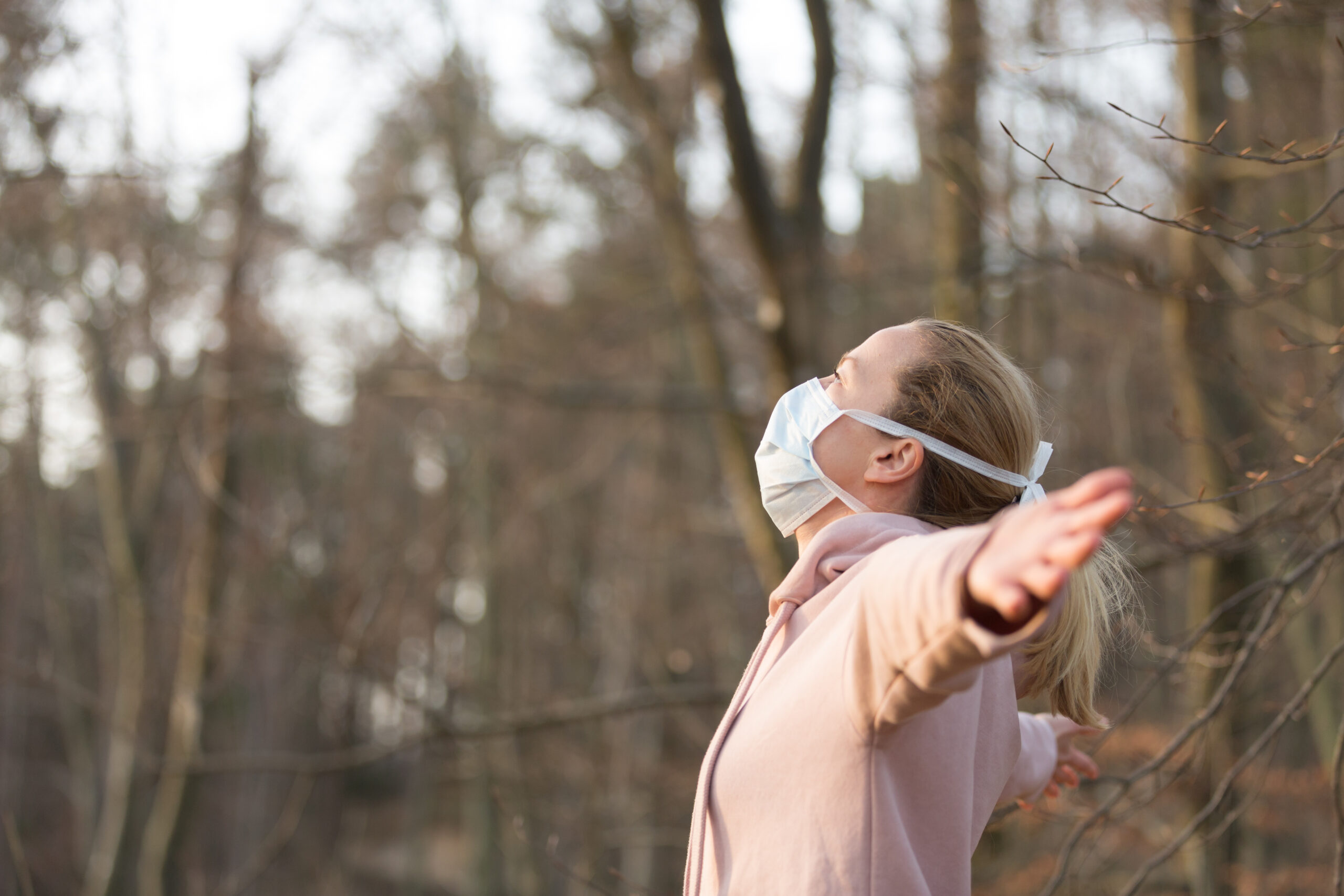
 When Dennis Rosenfeld, of LaGrangeville, New York, realized he needed help, he found it through SMART Recovery. SMART worked so well for Dennis, that he decided to give back. In 2017, he became an online volunteer. Dennis now facilitates four meetings a week and since 2018 is on the SMART Recovery Online (SROL) Leadership Team. […]
When Dennis Rosenfeld, of LaGrangeville, New York, realized he needed help, he found it through SMART Recovery. SMART worked so well for Dennis, that he decided to give back. In 2017, he became an online volunteer. Dennis now facilitates four meetings a week and since 2018 is on the SMART Recovery Online (SROL) Leadership Team. […]
During treatment, you were sheltered from the temptations of the outside world. You were provided with constant care, contact with the outside world was limited, and you had access to meetings, counseling, monitoring, and support, around the clock. All of these support mechanisms help you through the inevitable relapse triggers you experience in the early stages of recovery.
But what about life after leaving Fellowship Hall?
For anyone who is newly sober, learning to adapt and maintain your recovery in the “real” world again is a challenge. No longer protected by the shield of in-patient treatment, you must begin rebuilding your life by finding ways to cope with your personal triggers.
Think about the trigger mechanism of a gun; it must be pulled to spark the reaction that releases a bullet from the chamber. For those in recovery, relapsing can be viewed in the same light—people, places and things, or our feelings and thoughts, can pull that trigger. Without coping skills and immediate action, this pull of the trigger will put you right back where you started, back in your active addiction. These triggers during your early recovery may begin with something as small as a thought, which then leads to a craving, which then leads to a relapse. Once the bullet of a gun leaves the chamber, you can’t put it back, the choice is permanent. In many ways, a relapse is the same: it takes you right back to ground zero of your recovery— if you are lucky enough to survive it.
Each day life brings new challenges, new situations, and perhaps even unfamiliar feelings that you once numbed with substances. This is particularly true right now. We are all dealing with a new reality and trying to navigate our recovery in that new reality.
During early recovery, you are essentially an infant in the world of emotional sobriety while you establish your new personal base-line. Each individual is different in their disease, making it crucial for you to recognize what personally triggers you. Once you identify these triggers, you may then work to avoid them…
Here are seven steps to help YOU face your relapse triggers:
- Be aware of complacency, euphoric recall, and forgetting the pain that addiction has caused. Get in touch with the pain that your substance use caused.
- Be conscious not to drift away from recovery. Regular AA and NA attendance is extremely important. It’s an easy and common mistake for people to reduce meeting attendance, stop calling a sponsor, or just stop going to AA/NA altogether! Today that means adapting to the online meeting world, and making phone calls is more important than ever.
- Remember the H.A.L.T concept. When you become restless, irritable, and discontent, ask yourself, “Am I hungry, angry, lonely, or tired?” If so, these feelings could increase the risk of relapse. Only you have the power to address these feelings with the recovery tools you now possess.
- Talk about feelings openly in meetings and with a sponsor. Most people will never heal what they do not feel.
- Remember, the brain chemistry has been changed. You WILL be triggered at some point in time but don’t allow a trigger to be romanced into a craving. Remember, each time you get a craving and DON’T use or drink, a new pathway in the brain is formed. Overtime, the cravings will fade.
- Remember to assess your motives for being around certain people or going certain places.
- Think before you drink or use. The time to call that sponsor is before, not after!
Even with the best-laid plans to avoid relapse triggers and prevent relapse, the risk is always there. If you get caught off guard and slip-up, it does not mean that you are a failure and doomed forever. Recovery is always possible, as long as you are willing to pick yourself up and try again–and the sooner you act after a relapse the better.
About Fellowship Hall
Fellowship Hall is a 99-bed, private, not-for-profit alcohol and drug treatment center located on 120 tranquil acres in Greensboro, N.C. We provide treatment and evidence-based programs built upon the Twelve-Step model of recovery. We have been accredited by The Joint Commission since 1974 as a specialty hospital and are a member of the National Association of Addiction Treatment Providers. We are committed to providing exceptional, compassionate care to every individual we serve.
 Join the Delaware/District of Columbia/Maryland Region of SMART Recovery for the 5th Annual SMART Recovery East Coast Conference: What Sets SMART Apart! on Saturday, October 24, 2020. The morning keynote speaker will be Dr. Christopher C. Wagner, Ph.D., Associate Professor and Licensed Clinical Psychologist at Virginia Commonwealth University in Richmond, Virginia. His scholarship focuses on motivational interviewing and interpersonal processes […]
Join the Delaware/District of Columbia/Maryland Region of SMART Recovery for the 5th Annual SMART Recovery East Coast Conference: What Sets SMART Apart! on Saturday, October 24, 2020. The morning keynote speaker will be Dr. Christopher C. Wagner, Ph.D., Associate Professor and Licensed Clinical Psychologist at Virginia Commonwealth University in Richmond, Virginia. His scholarship focuses on motivational interviewing and interpersonal processes […]
 Charles Novak, MS, MLADC, learned about rational emotive behavior therapy (REBT) while in prison. The approach to overcoming addiction made sense to him, but when his five-year sentence ended, Novak discovered there wasn’t a similar treatment readily available. “There only seemed to be 12-step programs,” he recalls. While studying to be an addictions counselor, he learned more about […]
Charles Novak, MS, MLADC, learned about rational emotive behavior therapy (REBT) while in prison. The approach to overcoming addiction made sense to him, but when his five-year sentence ended, Novak discovered there wasn’t a similar treatment readily available. “There only seemed to be 12-step programs,” he recalls. While studying to be an addictions counselor, he learned more about […]
A Message from the Director on Racially Motivated Violence
jlinton
Thu, 06/04/2020 - 09:44

This is a painful week in the United States as we again confront the systemic racism that has plagued our country since its founding. Listening to the conversation on racism taking place right now in response to the recent violent deaths of African Americans is critical, and I encourage readers to hear what Black/African Americans are saying about their experiences.
NIH’s mission is to seek fundamental knowledge about the nature and behavior of living systems and the application of that knowledge to enhance health, lengthen life, and reduce illness and disability. Science has told us repeatedly that systematic, widespread discrimination of Black/African-American people is diametrically opposed to these aims, and what’s more, it is unacceptable and wrong.
The long history of discrimination against racial minorities in America bears directly on NIDA’s mission to address addiction as a disease rather than a moral failing to be dealt with through punishment. Whites and Black/African Americans use drugs at similar rates, but it is overwhelmingly the latter group who are singled out for arrest and incarceration. This use of drug use and addiction as a lever to suppress people of a particular race has had devastating effects on communities of color.
We know that science itself is at its best when it is most inclusive, and humans are best when we embrace diversity. Conversations about systemic racial inequalities can be uncomfortable but are clearly needed. Entrenched, systemic, pervasive racism is perpetuated by silence, and we cannot let it continue. I look forward to working with the addiction science community – researchers, the medical community, law enforcement, advocates, policymakers, other stakeholders and the public – to eradicate discrimination and promote equality.
Nora D. Volkow, M.D.
Director
Comments
Message from the Director
Thank you Dr. Volkow ~ We needed to hear from you. I am with you every step of the way, as I am sure all of us in this field must be. We all need to Stand Up and Speak Up. In Peace and Health, Teri
NIDA's role & complicity in perpetuating racial injustice.
Dr. Volkow,
Thank you for using your platform to draw attention to the discriminatory enforcement of America's anti-drug policies. While we appreciate your acknowledgement that these policies are applied in a prejudicial manner, it's quite disappointing that you were unable—or unwilling—to acknowledge that much of this sad reality can be attributed you and NIDA's actions.
The public looks to you as a leader. When you make statements like "yes, tobacco is more harmful for cancer—but marijuana is more harmful as it disrupts who you are as a person", you're actively perpetuating a nearly century long history—which was actively planned and perpetuated by US bureaucrats and politicians—of using marijuana consumption as a racist and xenophobic dogwhistle.
Even if one were to ignore the fact that "harming your humanity" is not a valid scientific concept, the fact that you've used your tremendous influence to engage in fear-mongering and traffic in racist stereotypes is shameful. I encourage you to spend some time learning about the pernicious role racism played in drug policy (not just drug policy enforcement), reckon with the harms you've helped to perpetuate, and work to start making amends.
Thank you.
The concept of racism virus
Racism is a socially transmitted disease from generation to generation, and it has evolved and it is evolving. The racism virus is causing a pandemic of racism, and there is no treatment, and cannot be stopped. Racism like addiction is a disease.
Racism Today
Thank you Dr Volkow!!
Access to Newsletter
Our researchers here at THCBD LLC (NJ based BioTech startup) agree 100% with Dr. VolKow's comments. Furthermore will we would like to point out that allowing Cannabis Sativa L. to say as a Schedule I Drug is a prohibition against science.
Schedule I does not allow cannabis researchers to advance cannabis science.
De-Schedule now!
All the best, Gaetano Lardieri, Cannabis Advocate and Entrepreneur, Founder THCBD LLC
So apropos- the fundmental problem is DRUGS!
Wholehearted agreement- just some issues with paragraph three.
Likely ‘classism’ more-so than racism is what haunts us. Economic growth can be an amazing antidote.
Addiction per se is not a crime! Treat addiction as a disease. Yes, Blacks and Whites use illicit drugs at similar rates. But arrest and incarceration derive from serious crimes- like robbery with dangerous weapons, vandalism, assault, drug dealing, repeat offenses, etc. Black Americans seem disproportionately arrested because cops are called to areas of real street crimes- which unfortunately happen to be disadvantaged communities. Let’s dispel the “marijuana possession mass incarceration” hoax.
Why is there so much violent crime in the inner cities? It’s DRUGS! Read news articles, police reports, etc; the connection to our drug culture is astonishing! Dealing, addiction, mental illness, whatever- many are simply not in their right minds. They rob, steal, resist arrest, carry weapons. Police will necessarily be harsh- with ANY ethnicity. BLM and the media cherrypick for political purposes.
Where is the drug demand? Turns out with some research and common sense, liberal/progressives (not monolithically) provide the disposable income and the demand that allows our drug culture to thrive! They’re the financiers of the veritable Latin American drug holocaust (seems racist to me), environmental destruction, the catalyst behind the opioid crisis, violence across America (drug gangs), ambush/murders of cops and the tragedy of the inner cities.
Let’s not be silent any more, be courageous and address the great American drug tragedy caused primarily by the progressive left.
Gracias
I often read their messages and interview. In this last message, you reveal one of the several ill-intentioned open and covert goals of drug trade and use. Thank you.
I love Nora Volkow
I love this woman. Historical perspective and a social conscience in a research scientist. I love Her. I love her. I love her.
MAT Treatment
Hello Dr. Volkow. I own an addiction treatment center in southern California. A portion of our counselors and some therapists are firm believers in the 12-Step abstinence model of addiction treatment, and... to be honest... they are not very open to MAT... Can you recommend some consultants that I can retain to help educate my resistant Clinical team ?
NIDA’s website has materials…
NIDA’s website has materials that show the crucial importance of medications in treatment for opioid addiction, including this: https://www.drugabuse.gov/publications/effective-treatments-opioid-addiction
The 2019 report by the National Academies of Science, Engineering, and Medicine, “Medications for Opioid Use Disorder Save Lives,” presents the evidence comprehensively: https://www.nap.edu/catalog/25310/medications-for-opioid-use-disorder-save-lives(a free pdf is available on that page).
Nora's Blog - Words Matter
Thank you Nora for writing about the importance of using terminology that helps avoids stigmatizing persons with addiction. As a professional working with addiction, I couldn't agree more.
 Provided by SMART Family & Friends Facilitator, Kathy Lang Surely one of the lessons of the past few months in dealing with COVID-19 has been the value of developing patience. In our Family & Friends meetings here at SMART, we often stress the importance of patience. Why? It’s because we recognize that it takes time for change to happen. […]
Provided by SMART Family & Friends Facilitator, Kathy Lang Surely one of the lessons of the past few months in dealing with COVID-19 has been the value of developing patience. In our Family & Friends meetings here at SMART, we often stress the importance of patience. Why? It’s because we recognize that it takes time for change to happen. […]
How to Maintain Recovery During Isolation: 6 Tips from Nataki Watson, a Primary Counselor at Fellowship Hall
It may sound cliché but right now we really are living in unprecedented times. There is immense anxiety and uncertainty all around. Staying focused, grounded, and connected have become quite difficult. The recovery community is built on the power of connection, so it stands to reason that maintaining one’s recovery in a time when we are all isolated from one another can seem like a momentous task.
Here are 6 recommendations for maintaining your recovery:
- Change the Channel
Stop watching the news!! It is incredibly overwhelming the amount of scary or sad news there is out there being constantly streamed in through the television, radio, and social media. Five minutes glancing through news stories is enough to raise your anxiety exponentially. There is a benefit to staying informed, but sticking to reputable news sources for a small allotment of time is more than enough information. Instead of reading or watching endless news, try a new book, or podcast, or TV show. This is also a good time to pick up some new recovery literature. The point is to replace the negative with something positive and uplifting; and if that can also be something that is recovery oriented, all the better.
- Keep an Open Mind
The cool thing about this time is we are discovering new ways of connecting with each other. Although it may not be in person, technology (and more free time) is allowing folks to reconnect with friends and loved ones all over the world. For some, it is really daunting not being able to attend meetings in person. Keeping an open mind and embracing technology can allow you to expand your meeting attendance in number, as well as geography. It’s been pretty cool dropping in on meetings all over the world, at all times of day! There are opportunities for smaller groups to coordinate and meet for more private and intimate talks as well. This is a great time to think outside the box to figure out how to use technology as a plus to boost your recovery. Staying connected with your network is vital; now is the time to lean into each other.
- Get Up and Get Out
When in doubt, get up and go outside! Personally, the closing of gyms has been HORRIBLE for me!! But, I decided to stop complaining about it and go outside. I have tried new trails, taken longer walks, and I even tried jogging…which I said I would NEVER do! The fresh air and exercise is great for anxiety and helps boost your mood. Even a walk around the neighborhood is invigorating and helps when your mind starts going down some negative paths. This is also a good time to listen to your favorite music, catch up on a podcast, or listen to an audio book. Again, use technology to your advantage! There are several great recovery based podcasts out there that are very helpful as well. A few to try out are: The Bubble Hour, Busy Living Sober, The Sober Guy, and The Boiled Owl Coffee Club.
- Keep Calm and Carry On
I cannot stress enough (no pun intended) the importance of meditation. You don’t need to be perfect at it, just intentional. The more you practice, the better you will be. It doesn’t take much at all to begin to feel the real benefits of it. Spirituality is the core of recovery. Taking time to reconnect with yourself-and your Higher Power- will go a long way to easing your stress. YouTube is full of thousands of different meditations that vary in type and length. There’s something for everyone regardless of your level of comfort or expertise. There are also several meditation apps available, many of which are free or low cost. A few suggestions are 12 Step Meditation and Daily Reflections for AA, NA, and Al-Anon; Calm; Ten Percent Happier; and Headspace.
- Lend a Helping Hand
One of the best ways to get out of your head and boost your mood is to show kindness to others. Service can be done in a wide variety of ways, and there is no better time than a global pandemic to show a little love to someone else. Although we must keep our distance, this is a great time to let others know that you see them and they matter. Volunteering to pick up groceries for an elderly neighbor; helping a friend’s child with their homework over video chat so their parent can take a break; or sending a hand written card or note to a friend or loved one that you haven’t spoken to in a while are just a few examples of things that you can do to take your mind off what may be troubling you and keep you busy giving back and sowing a little kindness. Get creative with it; nothing supports healthy recovery like service.
- Keep an Attitude of Gratitude
Last but certainly not least, take a moment or two each day to remember all the things you have to be grateful for. We all have so much to be grateful for, including the fact that you have made it through another day without drinking or using. Sometimes, that fact can be easily blocked out by the noise and the chaos of all the things that feel like they are going wrong and are definitely out of our control. Being intentional and taking the time to really count your blessings, is a quick way to help you regroup and refocus.
About the writer, Primary Counselor Nataki Watson
 Nataki Watson is a Primary Counselor at Fellowship Hall. Prior to joining the Fellowship Hall team, she worked as a Behavioral Assessment Counselor and Inpatient Case Manager. As a former Assessment Counselor, she completed psycho-social assessments with new guests entering treatment where she enjoyed meeting and getting to know each guest as they began, or sometimes continued, their recovery journey. She is passionate about connecting with others and providing them with the opportunity to really be seen and heard.
Nataki Watson is a Primary Counselor at Fellowship Hall. Prior to joining the Fellowship Hall team, she worked as a Behavioral Assessment Counselor and Inpatient Case Manager. As a former Assessment Counselor, she completed psycho-social assessments with new guests entering treatment where she enjoyed meeting and getting to know each guest as they began, or sometimes continued, their recovery journey. She is passionate about connecting with others and providing them with the opportunity to really be seen and heard.
About Fellowship Hall
Fellowship Hall is a 99-bed, private, not-for-profit alcohol and drug treatment center located on 120 tranquil acres in Greensboro, N.C. We provide treatment and evidence-based programs built upon the Twelve-Step model of recovery. We have been accredited by The Joint Commission since 1974 as a specialty hospital and are a member of the National Association of Addiction Treatment Providers. We are committed to providing exceptional, compassionate care to every individual we serve.
A Memorial Day Message from Justice For Vets Director Scott Tirocchi
Each year, my small New England town of about 4,000 has a Memorial Day parade. Participants will typically “step off” promptly at 8:30 a.m. Led by a color guard, we watch local marching bands, youth scouting organizations, and veterans from the local American Legion Post. Close behind them will be the 4H Club, followed by members of the town council and school committee. Next, the volunteer ambulance corps and the police department. And finally, the volunteer fire department will proceed by. From start to finish, the parade takes about 25 minutes, and the entire route is just under half a mile.
As the parade moves, so too will the spectators. Both participants and spectators alike will end up gathering en masse in the town center. When there is a general sense that everyone is present, a lull will pass over the crowd, and the organizer of the event will cue the band to play the national anthem and, once complete, lead everyone in the Pledge of Allegiance. A prayer will be spoken by a member of the clergy. Then a local veteran will say a few solemn words, share a story based in sacrifice, and request a moment of silence to honor those who died in the service of this country. A wreath will be laid at the base of the granite veterans memorial. The sounding echo of “Taps” played off in the distance by a local high school student will conclude the event. The gathering will soon disperse.
My family and I are going to miss this year’s Memorial Day Parade and Remembrance Ceremony, which has been canceled because of the pandemic. For many of you, your usual Memorial Day public activities will be canceled, too. I wanted to share my town’s tradition with all of you because, despite this national crisis, we have a responsibility to remember. By describing my annual event, perhaps you can picture it unfolding this Memorial Day, or think of ceremonies you have been part of in the past. This year, Memorial Day will be different than any other. These ceremonies may not occur in real time, but nothing can stop the remembrance in our hearts; a tradition that pays homage to those service men and women who died while serving this nation. We will never forget them.
Have a safe and peaceful Memorial Day.
Sincerely, Scott Tirocchi
Director, Justice For Vets
The post A Responsibility to Remember appeared first on NADCP.org.
Addressing the Stigma that Surrounds Addiction
mfleming
Mon, 05/25/2020 - 12:44
Untreated drug and alcohol use contribute to tens of thousands of deaths every year and impact the lives of many more. Healthcare already has effective tools including medications for opioid and alcohol use disorder that could prevent many of these deaths, but they are not being utilized widely enough, and many people who could benefit do not even seek them out. One important reason is the stigma that surrounds people with addiction.

Stigma is a problem with health conditions ranging from cancer and HIV to many mental illnesses. Some gains have been made in reducing stigma around certain conditions; public education and widespread use of effective medications has demystified depression, for instance, making it somewhat less taboo now than it was in past generations. But little progress has been made in removing the stigma around substance use disorders. People with addiction continue to be blamed for their disease. Even though medicine long ago reached a consensus that addiction is a complex brain disorder with behavioral components, the public and even many in healthcare and the justice system continue to view it as a result of moral weakness and flawed character.
Stigma on the part of healthcare providers who tacitly see a patient’s drug or alcohol problem as their own fault leads to substandard care or even to rejecting individuals seeking treatment. People showing signs of acute intoxication or withdrawal symptoms are sometimes expelled from emergency rooms by staff fearful of their behavior or assuming they are only seeking drugs. People with addiction internalize this stigma, feeling shame and refusing to seek treatment as a result.
In a Perspective I published recently in The New England Journal of Medicine, I tell the story about a man I met who was injecting heroin in his leg at a “shooting gallery”—a makeshift injection site—in San Juan, Puerto Rico, during a visit to that country several years ago. His leg was severely infected, and I urged him to visit an emergency room—but he refused. He had been treated horribly on previous occasions, so preferred risking his life, or probable amputation, to the prospect of repeating his humiliation.
This highlights a dimension of stigma that has been less remarked on in the literature and that is uniquely important for people with substance use disorders: Beyond just impeding the provision or seeking of care, stigma may actually enhance or reinstate drug use, playing a key part in the vicious cycle that drives addicted people to continue using drugs.
Previously on this blog I highlighted research by Marco Venniro at NIDA’s Intramural Research Program, showing that rodents dependent on heroin or methamphetamine still choose social interaction over drug self-administration, given a choice; but when the social choice is punished, the animals revert to the drug. It is a profound finding, very likely applicable to humans, since we are highly social beings. Some of us respond to social as well as physical punishments by turning to substances to alleviate our pain. The humiliating rejection experienced by people who are stigmatized for their drug use acts as a powerful social punishment, driving them to continue and perhaps intensify their drug-taking.
The stigmatization of people with substance use disorders may be even more problematic in the current COVID-19 crisis. In addition to their greater risk through homelessness and drug use itself, the legitimate fear around contagion may mean that bystanders or even first responders will be reluctant to administer naloxone to people who have overdosed. And there is a danger that overtaxed hospitals will preferentially pass over those with obvious drug problems when making difficult decisions about where to direct lifesaving personnel and resources.
Alleviating stigma is not easy, in part because the rejection of people with addiction or mental illness arises from violations of social norms. Even people in healthcare, if they do not have training in caring for people with substance use disorders, may be at a loss as to how to interact with someone acting threateningly because of withdrawal or some drugs’ effects (e.g., PCP). It is crucial that people across healthcare, from staff in emergency departments to physicians, nurses, and physician assistants, be trained in caring compassionately and competently for people with substance use disorders. Treating patients with dignity and compassion is the first step.
There must be wider recognition that susceptibility to the brain changes in addiction are substantially influenced by factors outside an individual’s control, such as genetics or the environment in which one is born and raised, and that medical care is often necessary to facilitate recovery as well as avert the worst outcomes like overdose. When people with addiction are stigmatized and rejected, especially by those within healthcare, it only contributes to the vicious cycle that entrenches their disease.
See also - Words Matter - Terms to Use and Avoid When Talking About Addiction
Comments
Thanks
Thank you so much Dr. Nora for this article. And for understanding people like me. I'm currently on 11 months clean from alcohol, marijuana and crack cocaine addiction. I have struggled with substance abuse for 30 years. I'm am glad that I found subscribed to your blog to learn more about my illness.
Stigma of addiction
I understand the devastating effects that stigma has on someone suffering addiction. I myself have substance abuse issues and my step daughter committed suicide in 2013 at the age of 20 because she was so ashamed of her heroin addiction. It is great to see information about changing the way society views this condition finally being published publicly.
Dr. Volkow's Insight on Stigma
As always, Dr. Volkow does a wonderful job of highlighting the challenges individuals face when they seek help for substance use disorders. It is critically important that those of us in the healthcare field continue to advocate for our patients and combat stigma on a daily basis. Effective treatment is out there, but not enough people are able to or wiling to access it (in part because of stigma). We need to change that! Thanks again to Dr. Volkow for her outstanding leadership in this area.
Addiction is not a communicable disease- let's not pretend it is
Of course and resoundingly so, we should show impartial compassion toward anyone who is addicted to drugs or alcohol, medically treat their conditions, avoid the stigma and apply all we can for positive outcomes. Society needs to fully understand that there are conducive hereditary and environmental components that lead to addiction.
On the other hand, why can't we shame and stigmatize the widespread, popular drug culture that condones and promotes substance abuse to begin with? The lure and appeal to be a part of it, to be 'cool' so-to-speak, the 'sex appeal', while knowing the risks, is indeed a sign of flawed character and moral weakness. Celebrity lifestyles (sports, music, Hollywood) for instance are very often replete with illegal and addictive drugs. Yet much our society respects, adores, adulates and mimics them and their lifestyles as though they are doing nothing wrong. We basically have a 'behavioral disease' so-to-speak that also needs to be addressed.
Addiction is not some kind of 'communicable disease', so let's now act like it is and pretend nobody is to blame. Basically, our country played with fire, and now we are getting burned.
anti tumor properties of Cannabis
Please stop blocking research on the benefits of Cannabis. I shrank my terminal ovarian cancer on cannabis. After 4 years of fighting with 2 major surgeries, 12 rounds of Taxol, 6 rounds of Doxorubicin and 21 rounds of Carbo have no more options. I will not reach my 50th birthday. But Cannabis shrank my tumor. I am trying to cure/manage my cancer despite you. You have NO excuse, the first paper to show anti tumor effects was published back in 1973. Activists have been begging you for decades. And the pre-clinical data is pouring from labs around the world. If I die- I die from the stonewalling of science and the immoral DEA policy that suppress medicine. schedule1movie.com
I am very sorry to hear about
I am very sorry to hear about your cancer struggle. The NIH does not block research on possible therapeutic uses of cannabis and cannabinoid compounds for cancer or other illnesses. A summary of past and ongoing cannabis research in cancer is provided by the National Cancer Institute. NIDA is also leading the effort to facilitate cannabis research through establishment of a standard dose of THC for scientific study purposes. The lack of such a standard has impeded the science on this drug because the drug itself and the ways people use it are so widely varied. I wish you the best of luck with whatever course of treatment you pursue.
Stigma extends beyond patients
The stigma associated with TREATING OUD, while perhaps not as personal for patients, affects those who step up to support recovery and get viewed askance by distributors who are wary of regulatory consequences and a fear that regulators will shut them down for supplying MAT meds to pharmacies for chronic use. When pharmacies get rationed or cut off on their orders for MAT, the risk to patients is real. Pharmacies MUST adhere to best practices and be open to inspection or audit. Yet, we need an active dialogue around how to promote increased use of MAT rather than an environment of fear and suspicion.
Civil rights combats discrimination misidentified as stigma
This summer, we celebrate 30 years of the passage of the Americans with Disabilities Act (ADA). Over the years, much has changed for people with disabilities to improve equal access to employment, and state and local government and public accommodations such as health care, while very little has changed for people with addiction recovery in these same areas. Today, thousands of people in recovery are unaware of their civil rights under the law. The part of the ADA that addresses Alcohol Use Disorder (AUD) and Substance Use Disorder (SUD) is the most underutilized part of the law. Knowing one’s rights can have a transformative effect on how we treat and care for one another in this country. Civil rights are a guiding force in combating discrimination often misidentified as stigma for people with AUD and SUD. Turning people away from emergency rooms and health care treatment because a person is under the influence of alcohol or drugs is a violation of the ADA.
addiction stigma
Based on 50yrs. of clinical experience in BHC here are some of my observations. Persons who experience addictions is widely seen as persons who exhibit very low Perceived Social Value (PSV) and perceive it as self-inflicted. And a # of primary care physicians are not sufficiently trained and thus reluctant to treat what they see as a high risk condition that is also illegal.
This is a significant hurdle to overcome.
Rich
A County of Lies!
I grew up here and my daughter is the third generation of women abused and neglected by this county as policy. Starting with being left alone as a child with a severely mentally ill mother; to being demonized and watching my child slice her arm on front of her father and losing my home trying to protect her and a $900 a MONTH share of cost because I WORKED! Unable to obtain detoxification services. This place has damaged us and not once has anyone even suggested trauma services....I am broke, devastated and my child...She is only 20 and already had a break. We are your mothers, children, a ROP Instructor and Mental Health Case Manager and I wouldn't believe it but my story is sadly not unique!
We are very sorry about what
We are very sorry about what you (and others) have experienced in in relation to addiction and mental illness. Both are extraordinarily difficult problems, and trauma is frequently a part it. There are recommendations and linkages to treatment provided by the National Institute of Mental Health: https://www.nimh.nih.gov/health/find-help/index.shtml and SAMHSA: https://www.samhsa.gov/find-treatment. In addition, several advocacy organization (NAMI and MHA) have local chapters to help you find support and services: https://www.nami.org/Home and https://www.mhanational.org/. Please don’t give up—people can recover their lives.
Coronavirus Lockdown Induced Day Drinking
I faced drug problems all my young life. I quit in November '16. On 4 May, when restrictions were lifted and wine shops reopened I started day drinking. Doctors were recommending drinking in moderation and people all over the world were drinking. I made me miserable. I have sought help from the local chapter of AA. I don't want to spend the rest of my life as an alcoholic. Brilliant blog.
Africans Needs Help
Please we the African need help regarding Addiction, drug and alcohol use is causing a lot of death in African more than poverty, mostly Nigeria and Ghana, and the government if not doing anything to help this. Please can the world come to out aid??
Thanks,
Miracle Ojo.
THE PROBLEM WITH OPIATE / ACETAMINOPHEN COMBINATION PRODUCTS
I am a retired Pharmacist from Lincoln, Nebraska.
I feel that the opioid/APAP combination should be removed from the market. I have appealed to the DEA, CDC and FDA with little to no response. The following is what I have sent to them.
Contributing risk factors for patients could be:
• Decreased weight and fatty tissues.
• Dehydration
• Alcohol consumption, current and historic
• Decreased Liver Enzyme function
• Potential renal failure
• Comorbidities (hepatitis, alcoholism and gastroenteritis)
• Quantities of medication consumed, especially as a result of diversion.
The Acetaminophen alone may be a factor causing death in some drug abusers, due to the large number of pills being taken. If not the direct cause, it could be a factor contributing to the increases in opiate toxicity and/or death, by compromising the metabolic, plasma distribution and renal excretion of the opiate. The diversion of these meds can lead to a cascade of effects, that would not be at the same level of Risk if they were only to be allowed to be made of their individual ingredients and not in combination.
THESE ARE REASONS THAT I FEEL SUPPORT THE REMOVAL OF THESE PRODUCTS AS A COMBINATION FROM CIRCULATION IN THE MEDICAL COMMUNITY.
Dwayne Wilson R.P.
Lincoln, NE
Determinism and destigmatization
"There must be wider recognition that susceptibility to the brain changes in addiction are substantially influenced by factors outside an individual’s control, such as genetics or the environment in which one is born and raised..."
Indeed! Accepting that there is a full and complete causal story behind the genesis of someone's addiction and their addictive behavior - even their voluntary choices - can help to reduce stigma. An open access paper in Neuroethics, "Determinism and destigmatization: mitigating blame for addiction" argues as much in the context of the ongoing debate about the disease model. doi: 10.1007/s12152-020-09440-w
 Like the The SMART Recovery program for individuals, the Family & Friends program provides science-based tools for self-empowered solutions. This introduction video shows why peer support is just as important to you as it is your loved in recovery. It also encourages taking the next step of attending a meeting where everyone is welcome. View […]
Like the The SMART Recovery program for individuals, the Family & Friends program provides science-based tools for self-empowered solutions. This introduction video shows why peer support is just as important to you as it is your loved in recovery. It also encourages taking the next step of attending a meeting where everyone is welcome. View […]



racial predjudice and blatant discrimination
on June 5, 2020
At the genetic level, all humans are highly concordant. Diversity promotes a much richer human experience. However, due to partisan politics all this is occurring within the deteriorating US Incivility War. Under these circumstances our challenge is even greater.
Rich